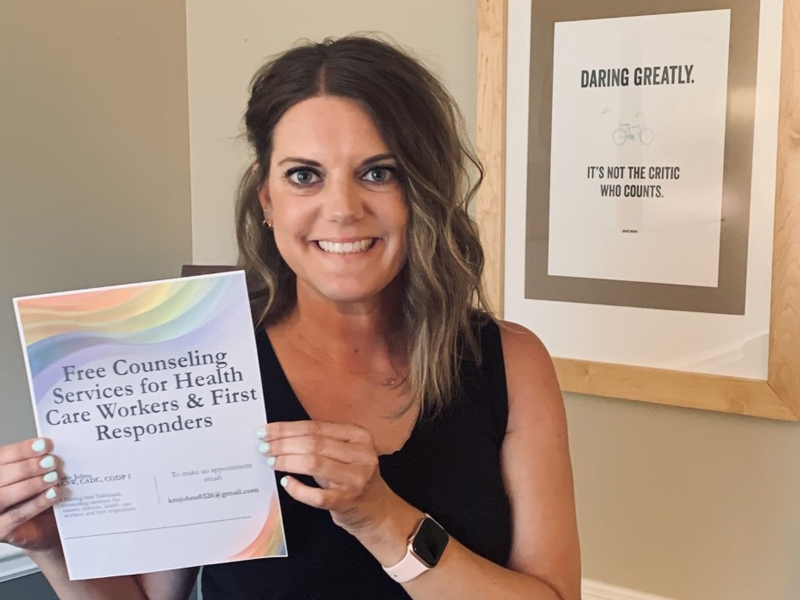‘I won’t turn them away’: AU alum offers free telehealth sessions to frontline workers
By Hal Conick | July 13, 2020

It was March when the COVID-19 pandemic first felt real to Katie Johns MSW ’09. She had seen news about the pandemic, but during a conversation with her sister, an emergency room nurse working 17-hour days, Johns was struck by the imprints on her sister’s face left by the protective equipment worn during her entire shift. Johns knew then that she needed to use her skills honed at Aurora University’s Master of Social Work program to help frontline workers manage their mental health.
“I felt like they needed a space to be able to talk and work through things,” Johns said. “As a Licensed Clinical Social Worker, I want to give my time and service to the industry that is showing up and working hard to keep us safe and well.”
Soon after the COVID-19 outbreak was deemed a pandemic, Johns became a first responder to the first responders, offering free telehealth counseling sessions to frontline workers. She created a flyer announcing free sessions and posted it on social media (the posts were shared more than 200 times), handed the flyer to her sister to post at the hospital, and provided it to a 911 dispatcher in DuPage County. Quickly, word of the free sessions spread. As of June, Johns had counseled more than a dozen frontline workers, offering some as many as 10 free sessions.
Johns is a behavioral specialist working in the suburban Chicago public school system. She focuses on children from toddler to 8th grade. Before she leaves for work in the morning, when she gets home at night, during breaks at work, and on the weekends — she squeezes in telehealth appointments with emergency medical technicians (EMTs), nurses, doctors, and firefighters.
During those telehealth counseling sessions, she says she hears the fear, the confusion, and the difficulty the frontline health care workers have processing long, strange days. Some are confused by the constant changes at work. Some are worried about the lack of personal protective equipment. Some are losing their jobs at hospitals due to delaying elective surgeries to care for COVID-19 patients, and face financial challenges. And some are sad that they have to avoid close contact with their children and families for fear of spreading the virus to them.
In her work with frontline clients, Johns said that she has drawn on the ethical principles of service, integrity, and social justice that she learned at Aurora University. Johns teaches clients the importance of taking care of themselves, but also the importance of keeping a strong community.
Her time at AU is a big reason why Johns knows the vast power of connection.
“Everyone needs to feel like they’re connected to other people, like they’re supported, especially amid tough times,” said Johns. “The importance of building a community and working as a community is something I learned at AU.”
In caring for herself, Johns has leaned on her own community of fellow social workers, many of whom she met more than a decade ago as a student at AU, where she now teaches as an adjunct professor. Johns says that her mentor Brenda Barnwell, dean of AU’s School of Social Work, has been essential to her career, helping her stay connected to others and grow as a social worker.
Johns continues to offer free sessions, sharing her flyer and social media posts in an attempt to help more people. Like everyone else, Johns doesn’t know when the pandemic will end, but she knows that there will be deleterious mental health effects for years to come. Frontline health care workers will need support long after COVID-19 is no longer a threat.
“I won’t turn them away,” she said.